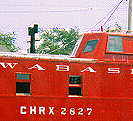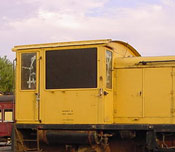Rolling Stock
Over the years Chessie has acquired several rail cars, all of which are now located on the Walkersville Southern Railroad in Walkersville, Maryland, a short distance northeast of Frederick, on a southern portion of the former Pennsylvania Railroad's Frederick Secondary.
 Our first acquisition was the former Wabash 2827, one of only a few such cabooses known to be operation. It has been restored to service in a "second life" of providing passenger service on the WS, and on at least one special charter run it was used as a platform for a marriage of a local couple. After serving for a dozen years in revenue service on the Walkersville Southern Railroad it was sidelined for repairs and restoration that were largely completed in the summer of 2013.
Our first acquisition was the former Wabash 2827, one of only a few such cabooses known to be operation. It has been restored to service in a "second life" of providing passenger service on the WS, and on at least one special charter run it was used as a platform for a marriage of a local couple. After serving for a dozen years in revenue service on the Walkersville Southern Railroad it was sidelined for repairs and restoration that were largely completed in the summer of 2013.
 Chessie later acquired the former Richmond, Fredericksburg & Potomac 923, one of six of its type purchased by the RF&P. Its restoration was completed in September 2008 and it is now in service on the Walkersville Southern Railroad.
Chessie later acquired the former Richmond, Fredericksburg & Potomac 923, one of six of its type purchased by the RF&P. Its restoration was completed in September 2008 and it is now in service on the Walkersville Southern Railroad.
 In 2003 the Chessie roster expanded to include the former Long Island Railroad commuter coach 7045. Following the cessation of operations on the West Virginia Northern Railroad in 1999 and the subsequent removal of track, the car was stranded on isolated track in West Virginia. The owner donated the car to Chessie, and we arranged for its trucking to Walkersville, where it was repaired and restored for passenger service. Through the generosity of a matching grant from the Potomac Chapter, NRHS, all of seats were reupholstered at the prison industry shops of Maryland
Correctional Enterprises in Hagerstown, Maryland. The 7045's comfortable seats allow riders to enjoy leisurely, old-fashioned trips from days of old. In mid-October 2012, at the request of the Ligonier Valley Railroad Association, we put decals above the car's windows reading LIGONIER VALLEY to bring attention to the Ligonier Valley Railroad, a shortline that operated in Pennsylvania from 1877 to 1952. The LGV's No. 52 was a coach similar in appearance to No. 7045 and the application of LGV decals on the car allows the defunct line's name to be seen again on active rolling stock, as shown here on the renovated 7045. In years past, sister cars ran on the Northeast Corridor through the greater DC area, as seen in this photo of MP54 cars rolling past Bowie, Maryland, in the late 1970s.
In 2003 the Chessie roster expanded to include the former Long Island Railroad commuter coach 7045. Following the cessation of operations on the West Virginia Northern Railroad in 1999 and the subsequent removal of track, the car was stranded on isolated track in West Virginia. The owner donated the car to Chessie, and we arranged for its trucking to Walkersville, where it was repaired and restored for passenger service. Through the generosity of a matching grant from the Potomac Chapter, NRHS, all of seats were reupholstered at the prison industry shops of Maryland
Correctional Enterprises in Hagerstown, Maryland. The 7045's comfortable seats allow riders to enjoy leisurely, old-fashioned trips from days of old. In mid-October 2012, at the request of the Ligonier Valley Railroad Association, we put decals above the car's windows reading LIGONIER VALLEY to bring attention to the Ligonier Valley Railroad, a shortline that operated in Pennsylvania from 1877 to 1952. The LGV's No. 52 was a coach similar in appearance to No. 7045 and the application of LGV decals on the car allows the defunct line's name to be seen again on active rolling stock, as shown here on the renovated 7045. In years past, sister cars ran on the Northeast Corridor through the greater DC area, as seen in this photo of MP54 cars rolling past Bowie, Maryland, in the late 1970s.
Chessie's largest acquisition, the Meadowlark, a Pullman parlor car, arrived via truck in Walkersville in 2006. In June 2012 the National Railway Historical Society provided us with a $1500 grant to help fund the removal of asbestos from pipes on the underside of the car. This work was completed by a contractor in January 2013.
 Our last acquisition was 20-ton Davenport locomotive in danger of being scrapped in Kentucky. Financed by member donations, it was moved in the fall of 2007 via truck to the Walkersville Southern Railroad enginehouse in Walkersville, MD, where restoration efforts competed with the time the WS had for various other projects. Originally it was hoped the new locomotive, designated as WS 3 but never painted as such, would someday run double-header trains with WS 2, a similar Davenport 25-ton that was once the line's main motive power; however, over time numerous other locomotives have come to the WS and the need for No. 3 diminished entirely. By 2018 there were hopes to restore it for use in track maintenance efforts on the Belfast & Moosehead Lake Railroad in Maine, but restoration took so long that the B&ML found another locomotive to meet its needs. Finally, without any projected future need for the locomotive, plus the acquisition of a GE 45-ton centercab locomotive in excellent condition in mid-2020, the WS decided to remove No. 3 from the rear of the enginehouse, where it had sat for many years, and park it on a storage siding down the track from the WS depot. On September 9, 2020, its windows were boarded up with plywood in anticipation of moving it into storage. It may serve as a parts source for No. 2 or it may be excessed.
Our last acquisition was 20-ton Davenport locomotive in danger of being scrapped in Kentucky. Financed by member donations, it was moved in the fall of 2007 via truck to the Walkersville Southern Railroad enginehouse in Walkersville, MD, where restoration efforts competed with the time the WS had for various other projects. Originally it was hoped the new locomotive, designated as WS 3 but never painted as such, would someday run double-header trains with WS 2, a similar Davenport 25-ton that was once the line's main motive power; however, over time numerous other locomotives have come to the WS and the need for No. 3 diminished entirely. By 2018 there were hopes to restore it for use in track maintenance efforts on the Belfast & Moosehead Lake Railroad in Maine, but restoration took so long that the B&ML found another locomotive to meet its needs. Finally, without any projected future need for the locomotive, plus the acquisition of a GE 45-ton centercab locomotive in excellent condition in mid-2020, the WS decided to remove No. 3 from the rear of the enginehouse, where it had sat for many years, and park it on a storage siding down the track from the WS depot. On September 9, 2020, its windows were boarded up with plywood in anticipation of moving it into storage. It may serve as a parts source for No. 2 or it may be excessed.
The locomotive was built in 1942 as US Army 7707 and used at Baltimore's long-closed Fort Holabird, then sold for commercial use after the war.
Eventually the Meadowlark, ex-LIRR 7045 and the 20-ton Davenport were turned over to the WSRR, leaving the CRA with just its two cabooses.